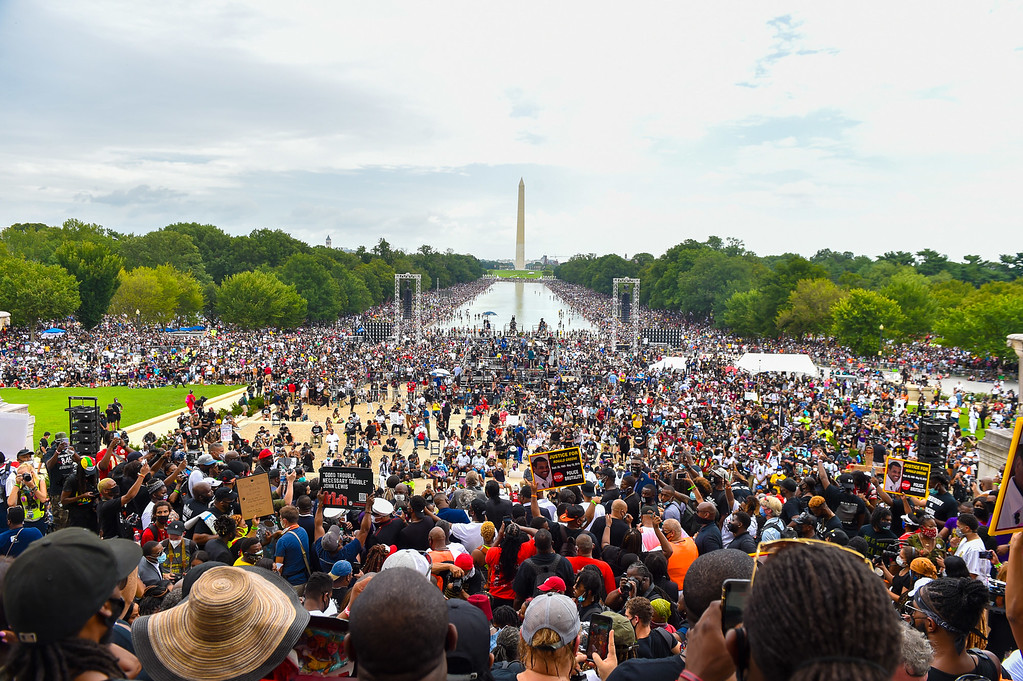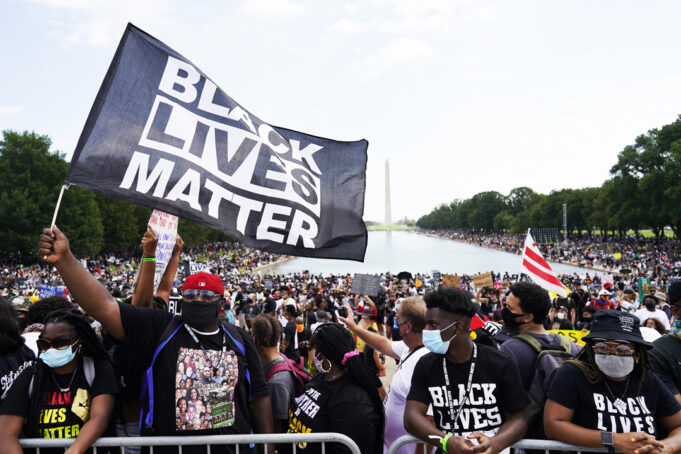WASHINGTON—The summer of virus and rage culminated at the Lincoln Memorial with the political gathering of the summer as thousands of mostly Black and Brown people, young and old gathered to demand change on the same day as the first March on Washington almost six decades ago.
It was 57 years to the day when Martin Luther King predicted in his historic “I Have a Dream” speech that “the whirlwinds of revolt will continue to shake the foundations of our nation until the bright day of justice emerges.”
A few short months ago, George Floyd died in police custody in Minneapolis, causing an earthquake of revolt, shaking America to its core and sparking the cry “get your knee off our necks.” A now fired and charged White cop sat with his knee on the neck of the Houston native as life left the Black man’s body.
Five days before the march, Jacob Blake was left paralyzed after being shot in the back by a Kenosha, Wisc., police officer, sparking unrest, fires, confrontations, rallies and the death of three people in the streets as the cry for justice was made.
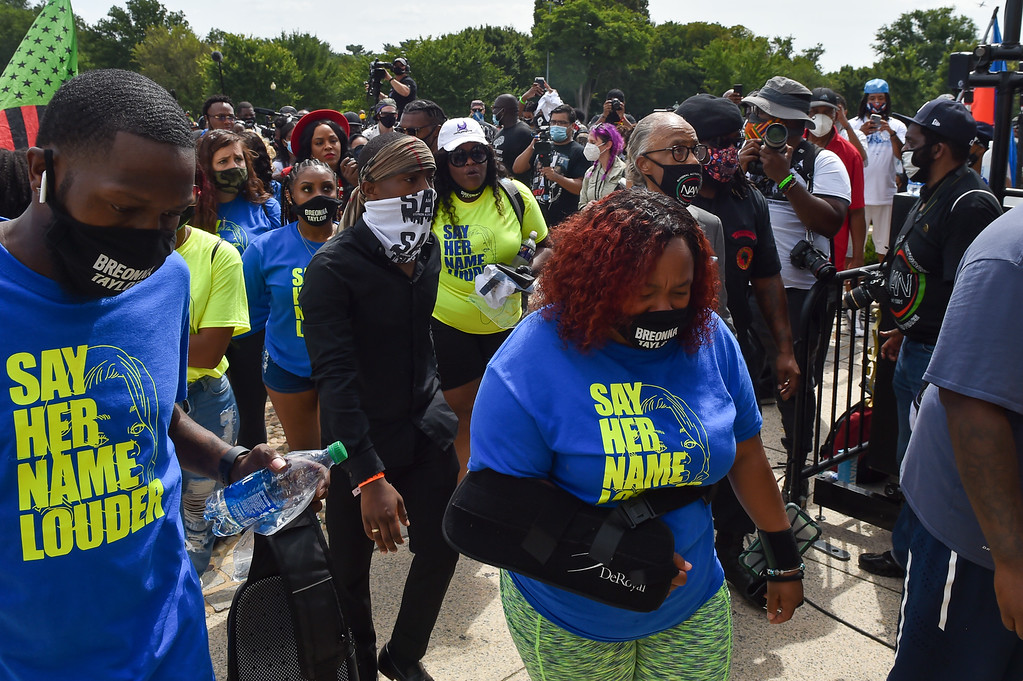
Two days before the march, the greatest basketball players on the planet stopped playing as part of the demand for justice.
“The Commitment March: Get Your Knee Off Our Necks” was organized by Martin Luther King III and the Rev. Al Sharpton and the National Action Network, who called for the action June 7 during his eulogy for George Floyd.
Thousands came out, standing in far-stretched lines in sweltering heat as coronavirus prevention protocols were implemented. March organizers called on attendees Aug. 28 to practice social distancing and wear masks, which was practiced by many but was difficult.
Rev. Sharpton did not lose during his remarks about U.S. hypocrisy, despite Republican Nikki Hailey’s recent statement that “America is not a racist country.”
“We chose to hold the rally at the Lincoln Memorial to honor the 1963 March but also to highlight the broken promises President Abraham Lincoln made a century before that,” Rev. Sharpton said. “He promised us full citizenship if we fought to save the Union. We never got the full citizenship; we never got the reparations. We’ve come (here) because you promised, Mr. Lincoln and the promise has been broken.”
“We must never forget the American nightmare of racist violence exemplified when Emmett Till was murdered on this day in 1955, and the criminal justice system failed to convict his killers,” said Martin Luther King III, son of the slain civil rights leader, during his remarks. Sixty-five years later (after Till’s murder), we still struggle for justice, the original march was for jobs and justice, and we are still calling for jobs and justice—demilitarizing the police, dismantling mass incarceration, and declaring as determinately as we can that Black lives matter,” Mr. King III said.
Family members of Eric Garner, Botham Jean, Joel Acevedo, Oscar Grant, Dontre Hamilton and others hurt or lost to police violence spoke at the gathering along with politicians, civil rights and social justice activists from the steps of the Lincoln Memorial. They called for an end to systemic racism, showing up at Nov. 3 polls, and for the U.S. Senate to pass the George Floyd Justice in Policing Act and the John Lewis Voting Rights Advancement Act.
“We will not be a footstool to oppression,” Jacob Blake’s sister, Letetra Widman, vowed. “Black America, I hold you accountable. You must stand. You must fight, but not with violence and chaos.” Her brother was shut at least seven times in the back by a White cop as he walked away from Kenosha, Wisc. police officers. He is now paralyzed from the waist down.
“My brother cannot be a voice today. We have to be the voice. We have to be the change,” George Floyd’s sister, Bridget Floyd, said. Her brother died after fired and charged former cop Derek Chauvin kneeled on his neck for almost nine minutes as his life drained away.
“We’re at a point we can get that change,” Breonna Taylor’s mother, Tamika Palmer, said, “but we have to stand together.” Her daughter was shot to death during a no-knock police raid in Louisville, Ky. No one has been charged in the young Black woman’s death.
Jacob Blake Sr., the father of Jacob Blake, declared: “There’s a White system, and there’s a Black system. The Black system ain’t doing so well, but we’re going to stand up. Every Black person in the United States is going to stand up. We’re tired. I’m tired of looking at cameras and seeing these young Black and Brown people suffer.”
Trayvon Martin’s mother, Sybrina Fulton, added, “Even though we’re going through a crisis, even though it looks dark, I want to tell you to be encouraged. Don’t stop saying, Black Lives Matter. Don’t stop peaceful protesting, don’t stop praying, don’t stop uniting, stand together. This is what this is about—we’re built for this.” Her son was shot to death by vigilante George Zimmerman in Sanford, Fla., in 2012. Mr. Zimmerman was not convicted of wrongdoing.
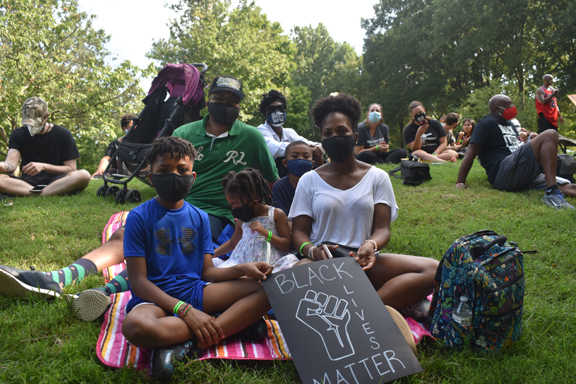
A family listens to speakers Aug. 28, at the 57th anniversary of the March on Washington. 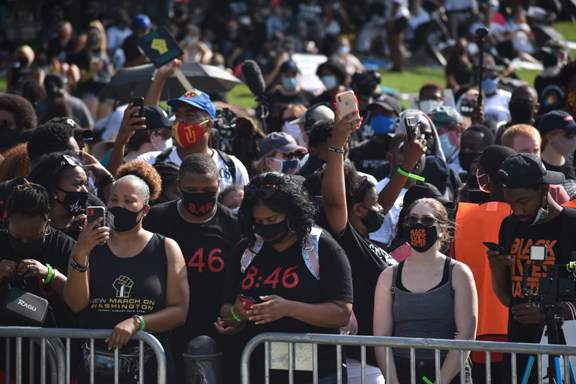
Attendees stand during the event.
Yolanda Renee King, a 12-year-old granddaughter of Martin Luther King, Jr., eloquently addressed her peers and thousands present.
“We have mastered the selfie and TikToks. Now we must master ourselves,” she said. “Less than a year before he was assassinated, my grandfather predicted this very moment. He said that we were moving into a new phase of the struggle. The first phase was civil rights, and the new phase is genuine equality.”
The young Miss King predicted her generation would end gun violence, police brutality, systemic racism, poverty, and climate change.
“My generation has already taken to the streets peacefully and with masks and socially distanced to protest racism. And I want to ask the young people here to join me in pledging that we have only just begun to fight and that we will be the generation that moves from ‘me’ to ‘we,’ ” she said.
Wanda Johnson, the mother of Oscar Grant, who was killed in 2009 by a transit police officer while handcuffed and lying on his stomach in Oakland, told The Final Call, “I hope this march will bring change. Martin Luther King had the dream to see a different nation. And as we continue to fight and unify together, we can see changes in our society, especially as we a people of color come together as one unified in love, working to change the systemic racism that we face in our country.”
Ashley Carr, sister of Atatiana Jefferson killed by police in Austin, Texas in 2019 while in her home told The Final Call, “We must put our voices together and become part of this change that we are trying to force as far as police reform. Enough is enough. We are already there; we don’t need any more hashtags to lost loved ones so suddenly and egregious. It’s enough, so we are trying to put our voices together and be heard because this is ridiculous.”
Rachel Noerdlinger, a spokesperson, said the National Action Network “doesn’t give numbers but we have heard from a multiplicity of sources that it was upwards of 200,000” in attendance. The day ended with a march from the Lincoln Memorial to the King Memorial.
Rev. Jonathan E. D. Moseley, Sr., president of the Los Angeles Chapter of the National Action Network and the Western Regional Director, helped facilitate some of what was needed to help make the event a success. Traveling all the way from the West Coast was well worth the effort, he said.
“In retrospect, it was a historic event. Even during this time of this pandemic, anticipation of participants far exceeded what initial numbers were. We had anticipated somewhere between 75,000 to 80,000 people being there, and it was closer to over 200,000,” said Rev. Mosley.
Because of the march, people gained a greater awareness of where the country is, and the challenges people face became more real than ever, he said. “It’s not just looking at and listen to the media and what they’re saying. We had a lot of members of families that have been slain by law enforcement, so it’s moving into the next phase of pushing the agenda of the George Floyd bill as well as the John Lewis Voting Rights Act.”
“People are more determined now to get out and vote and making sure that our voices are heard, and making sure that those elected officials are held accountable. It’s no time to just give them a pass because we vote for them. Now, they have to do what they say they’re going to do,” said Rev. Mosley.
Rev. Mosley was buoyed by the participation of young people. “That was what was most impressive, the number, the percentage of youth that were there. And again, these are the bearers of the banner now to look forward,” said Rev. Mosley.
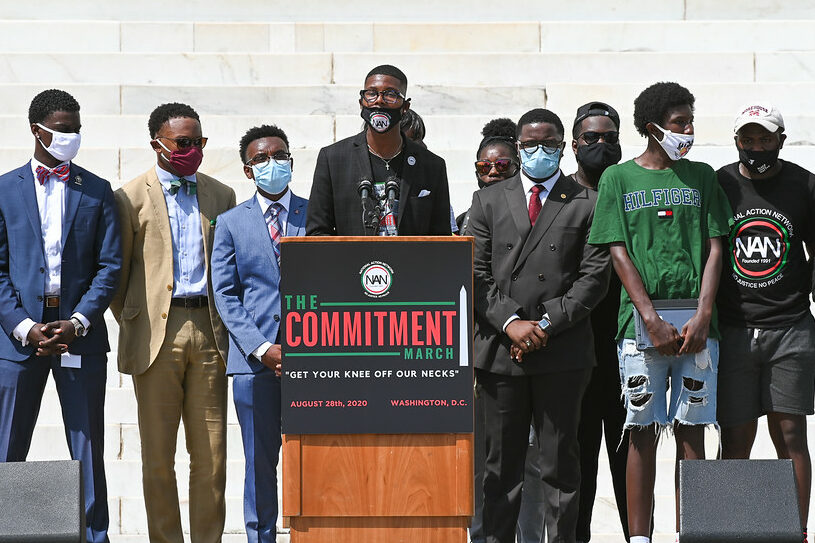
“Highlighting the history of 1963 and the focus of 2020 couldn’t be a more clear call to action for Black people in America. It was a beautiful sight to see thousands of mostly Black people gather in Washington, D.C., to stand up for the lives we’ve lost such as Breonna Taylor and George Floyd as well as to stand for Jacob Blake who by God’s will is still here with us,” said Rev. Shane Harris, also from Los Angeles, the national president and founder of the Peoples Alliance for Justice.
“It was inspiring to see Black people gathered together from different backgrounds and communities demanding justice. I commend Rev. Al Sharpton and NAN for their leadership in organizing this march to make sure it was mission focused and our issues are at the forefront of the 2020 election—which is the most important election of the decade,” he said. “Not one incident, everyone wearing masks and the focus of the George Floyd Justice in Policing Act being pushed through the United States Senate and put on the president’s desk for him to sign it was historic at best. The most important call to action of the gathering is that we must mobilize the vote and fight back against voter suppression in certain areas of this country. We must show up and vote our interest not being swayed by feel good words but thoughtful action and we must vote down the ballot to our local elections.”
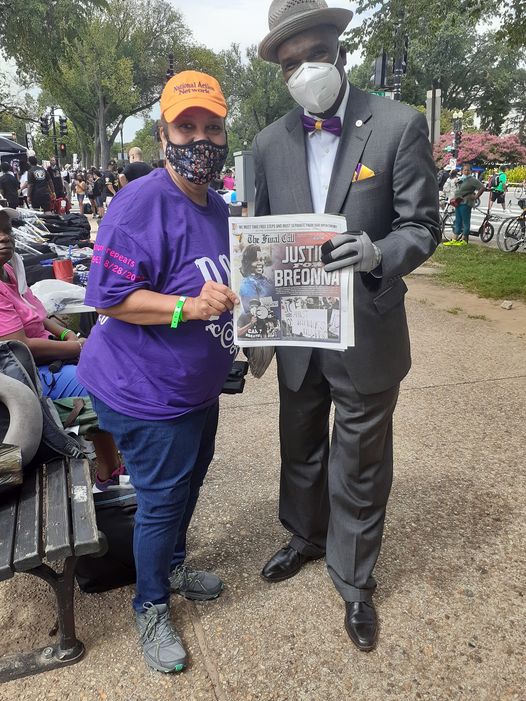
Photo: Facebook/Maureen Forte
Maureen Forte, veteran worker, supporter and former leader of the National Action Network chapter in Chicago, organized about 100 people to come to the march. She helped register voters while there and largely enjoyed the gathering, but some things did bother her.
So many homeless people in the Nation’s Capital, the fencing and barriers around the White House and the continued threats to Black America were troublesome, she said. “The 50th anniversary we were there for Trayvon Martin for the 57th it hasn’t gotten better, it’s gotten worse,” said Ms. Forte, who works on behalf of ex-felons, or returning citizens.
The march was personal to her and two women that traveled with her: One woman’s grandmother was decapitated for registering voters in the South, the other was the daughter of a pastor of an historic Black church and Ms. Forte’s uncle, the Rev. Fred Shuttlesworth spoke at the 1963 March.
She agrees President Trump has to go and believes if Blacks unite and pressure Mr. Biden, they can get things. But, she said, the key is unity. She was also selected to the Democratic Convention as a delegate for progressive Sen. Bernie Sanders.
She enjoyed seeing young people at the march, but many didn’t know much beyond “I Have A Dream,” and knew no one by name expect Dr. King. That means we have to keep teaching, she said.
Ms. Forte was perturbed by how streets and highways that led to downtown hotels near the White House were cut off and had some fellow travelers suddenly kicked out of hotels because of a Covid-19 infection. She believes the hotels near the White House intentionally pushed out march attendees. And she blamed Mr. Trump for the street and highway closures as well as inconveniences such as bus drivers not allowed to stay with buses, causing problems at the end of the march. Then protestors took over away from the march and pulled a fire alarm at her hotel at night, she said.
The National Action Network said its “partners” of the Commitment March included the NAACP; National Urban League; the National Coalition on Black Civic Participation; Legal Defense Fund; Lawyers’ Committee for Civil Rights Under Law; The Leadership Conference; American Federation of Government Employees; American Federation of State, County and Municipal Employees; American Federation of Teachers; Americans for Democratic Action; A. Philip Randolph Institute; the Community Action Partnership; Hispanic Federation; One Union; League of United Latin American Citizens; PERIOD; Phi Beta Sigma Fraternity, Inc.; International Brotherhood of Teamsters; Dream Corps; Hip Hop Caucus; The Obsidian Collection; United Auto Workers (UAW); United Steel Workers (USW); and UnidosUS.
Covid-19 concerns sidelined some buses from bringing people physically to Washington, D.C. for the anniversary march. It was a good day, said Rev. Nelson Rivers III, the National Action Network’s vice president for religious affairs and external relations. He is based in North Charleston, S.C.
The group held a companion rally at the South Carolina State House where the activities in Washington was viewed by jumbotrons in lieu of traveling because of Covid restrictions.
The group delivered a letter to Republican Senator Lindsey Graham demanding he support the John Lewis Voting bill and the George Floyd Justice and Policing bill.
“It was a powerful opportunity for people around the state to come together for the issue of justice and righteousness and fairness and continuing the fight,” said Rev. Rivers. He told The Final Call the time now is critical as it was in 1963.
In 1963 there was immediate backlash after the march with the church bombing that killed four young Black girls in Birmingham Alabama. But it was the inspiration, motivation and organization after the march that led to sweeping changes with the civil rights act in 1964, Voting Rights Act of 1965 and the Fair Housing Act of 1968, he explained.
“In the span of just five years after the march, almost to the day, the three most significant civil rights pieces of legislations passed … other than the 13th, 14th and 15th Amendments,” Rev. Nelson reasoned. “The same thing is possible now; but it depends on whether the Black community turn out.”
Having walked 750 miles from Milwaukee, Wisc., Tory Lowe told The Final Call the trek took 25 days under extreme conditions. Marchers were arrested, shot at, shot, and harassed unmercifully, he said.
“This generation is up for the fight,” Mr. Lowe said. “As you can see in Kenosha following the Blake shooting, they got right on Kenosha. If they do something to us, they got to lose something. They think that we are playing games. They think we will compromise, but this new generation out there, they are not going for it. We want justice now. There has to be a price that they pay. If we don’t get it to shut it down, and that’s the attitude.”
Charlene Muhammad, Brian Muhammad and Final Call staff contributed to this report.
